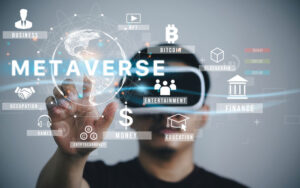Written by Scott Wilson

Today, one thing is enormously clear: anything that impacts social media impacts society.
According to Forbes, nearly 5 billion people worldwide made use of social media in 2023, or more than half of the Earth’s population. While the bulk of users are younger—84 percent of 18- to 29-year-olds use at least one site—it’s a phenomenon that crosses demographics. Nearly half of those over 65 use social media as well.
While we’re all so plugged in, social media companies hold enormous sway over our connections, perspectives, and access to information.
That’s a shared environment with a twist. While traditional media tagged in similar numbers, it represented a more uniform informational environment. With news feeds and friends designated by algorithms, social media has created as much divergence in society as connection.





Artificial intelligence will change all those aspects of social media. And only the best-educated AI experts will be able to get it right.
Social Media Has Created a Huge Impact on Society in a Short Time
 Social media is a phenomenon that isn’t much older than artificial intelligence.
Social media is a phenomenon that isn’t much older than artificial intelligence.
It all depends on when you date the earliest AI and what you think of as the first instances of social media. In some sense, though, the earliest examples of social media predate the open internet. Bulletin board systems, which users dialed into over phone lines, provided shared forums and file systems that fostered small communities as early as the 1980s.
The internet, of course, as well as the introduction of hand-held devices and integrated apps, turbocharged that very human inclination to share and relate. Today, the average user spends three hours on social media each day, spreading their attention across six or seven different platforms.
Unlike those early examples, shared social media today is primarily built by large companies that build forums for interaction. Facebook, TikTok, YouTube… some of the biggest corporations own the most valuable media properties on the planet.
That’s created some adverse incentives that go beyond the basic human yearning for interaction. Misinformation has created real challenges in safety and governance. Privacy breaches have become common. And bad actors create security threats through all the avenues those cracks open up in society.
For better or worse, social media has become the way that the world connects. To run those networks and keep those connections fresh, relevant, and safe, social media companies are increasingly turning to artificial intelligence.
How Will Artificial Intelligence Be Put to Use in Social Media?
Much of what AI will bring to the social media industry are things that social media is already doing. But artificial intelligence will do them better and faster.
If your Snapchat filters are looking particularly sexy lately, AI may be the reason why.
One of the big focus areas initially is recommendations. Social media firms have spent decades optimizing algorithms to put engaging content in front of customers. Yet the industry is full of cautionary tales where engagement falls apart. From MySpace to Google+, the titans of social networking have shown they don’t always understand what makes their own products tick.
Recommendations fuel engagement, and engagement is what pays the bills. Social media lives and breathes through advertising. AI also offers a path to profitability for social media companies that have struggled to monetize in line with their growth. Just as their all-encompassing recommendation algorithms will learn what customers like to see, they’ll work to optimize targeted advertisements and provide new insights to advertisers. That will make their data even more valuable than it is today.
Using AI to Make Social Media Safer, Smarter, and Better Connected
 AI may also assist in dealing with one of the biggest challenges facing social media today, which is moderation. The scale of modern social networks is vast. Nearly 100 million posts are made on Instagram each day. At peak, X sees around 350,000 tweets per minute. It’s tough for any human moderator to get a handle on.
AI may also assist in dealing with one of the biggest challenges facing social media today, which is moderation. The scale of modern social networks is vast. Nearly 100 million posts are made on Instagram each day. At peak, X sees around 350,000 tweets per minute. It’s tough for any human moderator to get a handle on.
But artificial intelligence isn’t constrained by big numbers—in fact, it feeds on them. So specially trained algorithms can instantly and constantly police posts for misinformation, criminal activity, or just plain old antisocial behavior. And with nuance and understanding that previous auto-moderation efforts were missing, it will offer a solution that will scale to even the largest social networks.
AI may also generate its own content or provide important context to posts people see, without the original poster having to do anything extra.
AI will also help social media organizations do a better job in their core role of connecting people. Not only will they be more likely to recommend more appealing accounts to follow, but they’ll take advantage of new AI-based language translation so you can understand those accounts no matter what language they are posting in—and vice versa. Built-in generative editors can help draft or revise posts, as well.
Finally, you can’t overlook the utility of social media to artificial intelligence development itself. Content generated by social media users accounts for a big chunk of the estimated 1.5 million terabytes of data generated by humans on the internet each day. That’s all real-world data that has been used to train the current generation of AI… and may make the next generation even smarter and more lifelike.
What Kind of Jobs Will Emerge for AI in Social Media?
Social media AI jobs will be found at social media companies. In fact, they’re already cooking at the big players, with titles like:
- AI Research Scientist
- Computational Social Scientist
- Vision Research Scientist
- Hardware Experience Engineer for Embodied AI
- AI Content Strategist
- Service Delivery Manager
- Model Labelling Product Specialist
- Evaluation Search Operations Specialist, AI
Many of these positions today revolve around research and analysis. Others are expansions of existing and substantial data science and analytics roles at these companies. There are already plenty of machine learning engineers and data scientists on the ground working on recommendation systems and analyzing engagement patterns.
It’s also likely that other big media companies in general will want to hire AI social media experts. After all, their marketing and connections with consumers already flow through social media. They’ll need analysts, trainers, and programmers who can understand how AI is impacting social media networks and can adjust their own efforts to match.
What Kind of Degrees Are Needed for AI Jobs in Social Media?
 Social media companies looking for AI talent are likely to lean in different directions depending on the type of media involved. For example, businesses like Reddit or X, which tend to feature text-based posts, are going to mostly be looking for experts in natural language processing. A Master of Science in Artificial Intelligence concentration in Natural Language Processing fills in the details of computational linguistics, artificial neural network development, and LLM (Large Language Model) training needed in these roles.
Social media companies looking for AI talent are likely to lean in different directions depending on the type of media involved. For example, businesses like Reddit or X, which tend to feature text-based posts, are going to mostly be looking for experts in natural language processing. A Master of Science in Artificial Intelligence concentration in Natural Language Processing fills in the details of computational linguistics, artificial neural network development, and LLM (Large Language Model) training needed in these roles.
Instagram or TikTok, on the other hand, which feature more visual content, will want professionals who have a strong background in computer vision and image processing. For those roles, a degree like a Master of Science in Artificial Intelligence concentration in Deep Learning and Computer Vision is a good choice.
In both cases, advanced degrees of those types are going to be the flavor of the month at social media organizations for quite a while. As they are working out the nuts and bolts of AI systems, graduates with real-world research skills and cutting-edge expertise are who the jobs are going to.
But in time, as social media becomes more tightly integrated with AI, and the basic systems have been put in place, more routine AI engineering and programming tasks will become common. For those kinds of jobs, more general and low-level degrees should be adequate. A Bachelor of Science in Artificial Intelligence or a Bachelor of Science in Computer Science in Artificial Intelligence and Machine Learning offer the foundational skills for keeping the machines fed and happy.
Post-College Education and Certification Options Can Improve Understanding of AI in Social Media
 It’s entirely possible to pick up the right niche areas of expertise without going through a full degree program, assuming the right background skills and knowledge. Anyone with a degree in computer science, math, or statistics may be able to crack into social media AI through a college certificate program.
It’s entirely possible to pick up the right niche areas of expertise without going through a full degree program, assuming the right background skills and knowledge. Anyone with a degree in computer science, math, or statistics may be able to crack into social media AI through a college certificate program.
Options like a Certificate in Machine Learning, or a Fundamentals of Applied Artificial Intelligence Certificate deliver the sort of focused training required. There are also certificates in more general areas that can be helpful in a thriving social media operation, particularly in the early stages of AI adoption. A Graduate Certificate in AI Foundations for Product Innovation not only delivers AI essentials, but with a view toward developing new services and tools.
These programs are short, clocking in at less than a year. That also makes them inexpensive. But with only a few courses, they aren’t comprehensive. So only candidates with a strong background in coding, statistical analysis, and algorithm development will be able to make them work.
Doing the work is one thing; proving you’ve got the skills is something else. That’s where another sort of certificate comes in, a professional certification in artificial intelligence.
Unlike educational certificates, these aren’t offered by colleges. Instead, platform vendors like Google or Amazon, or professional industry groups, like ISACA, manage them. They are designed to validate skills and knowledge in highly specific applications. That’s usually managed through exams, verification of education and experience, and occasionally through short and specific training exercises.
Artificial intelligence can bring both good and bad to the social media experience. But either way, it’s coming fast. The industry will need capable, ethical, well-trained experts in AI to avoid tearing itself, and society, apart.






